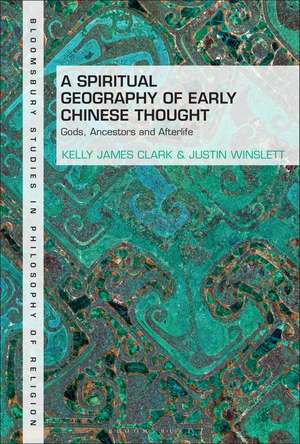A Spiritual Geography of Early Chinese Thought: Gods, Ancestors, and Afterlife: Bloomsbury Studies in Philosophy of Religion
Autor Kelly James Clark, Justin Winsletten Limba Engleză Paperback – 24 iul 2024
| Toate formatele și edițiile | Preț | Express |
|---|---|---|
| Paperback (1) | 191.22 lei 6-8 săpt. | |
| Bloomsbury Publishing – 24 iul 2024 | 191.22 lei 6-8 săpt. | |
| Hardback (1) | 510.42 lei 6-8 săpt. | |
| Bloomsbury Publishing – 25 ian 2023 | 510.42 lei 6-8 săpt. |
Din seria Bloomsbury Studies in Philosophy of Religion
- 30%
 Preț: 527.07 lei
Preț: 527.07 lei - 22%
 Preț: 224.66 lei
Preț: 224.66 lei - 19%
 Preț: 191.38 lei
Preț: 191.38 lei - 13%
 Preț: 254.19 lei
Preț: 254.19 lei - 22%
 Preț: 232.90 lei
Preț: 232.90 lei - 12%
 Preț: 234.38 lei
Preț: 234.38 lei -
 Preț: 258.42 lei
Preț: 258.42 lei - 13%
 Preț: 255.84 lei
Preț: 255.84 lei - 13%
 Preț: 224.58 lei
Preț: 224.58 lei - 31%
 Preț: 830.20 lei
Preț: 830.20 lei - 22%
 Preț: 257.50 lei
Preț: 257.50 lei -
 Preț: 257.03 lei
Preț: 257.03 lei -
 Preț: 259.42 lei
Preț: 259.42 lei -
 Preț: 254.93 lei
Preț: 254.93 lei - 21%
 Preț: 216.52 lei
Preț: 216.52 lei - 23%
 Preț: 190.50 lei
Preț: 190.50 lei - 23%
 Preț: 192.30 lei
Preț: 192.30 lei
Preț: 191.22 lei
Preț vechi: 249.30 lei
-23% Nou
Puncte Express: 287
Preț estimativ în valută:
36.59€ • 37.97$ • 30.59£
36.59€ • 37.97$ • 30.59£
Carte tipărită la comandă
Livrare economică 17-31 martie
Preluare comenzi: 021 569.72.76
Specificații
ISBN-13: 9781350262218
ISBN-10: 1350262218
Pagini: 232
Dimensiuni: 156 x 234 x 25 mm
Greutate: 0.33 kg
Editura: Bloomsbury Publishing
Colecția Bloomsbury Academic
Seria Bloomsbury Studies in Philosophy of Religion
Locul publicării:London, United Kingdom
ISBN-10: 1350262218
Pagini: 232
Dimensiuni: 156 x 234 x 25 mm
Greutate: 0.33 kg
Editura: Bloomsbury Publishing
Colecția Bloomsbury Academic
Seria Bloomsbury Studies in Philosophy of Religion
Locul publicării:London, United Kingdom
Caracteristici
Provides an important corrective to the commonly-held claim that religious beliefs and practices in early Chinese texts have no philosophical significance
Notă biografică
Kelly James Clark is Distinguished Professor of Philosophy at Ibn Haldun University, Istanbul.Justin Winslett is University Lecturer in Chinese Studies at the University of Sheffield, UK.
Cuprins
List of TablesIntroduction Part I. High Gods and their Critics1. Heaven and the High God(s) in Early China2. Heaven in the Xunzi, Mozi and Zhuangzi3. The Depersonalization of Heaven? Part II. Gods and "the Philosophers" 4. Was Confucius a Theist?5. Mencius on Heaven Part III. Ancestors and Afterlife6. The Soul and the Afterlife7. Sacrifice Part IV. A Deeper Dive8. The Evolutionary Psychology of Chinese Religion9. Lesser Deities of the Pre-Imperial Era Appendix: The Curious Case of Dong Shongshu NotesBibliographyIndex
Recenzii
Of the many Orientalist myths about China, the idea that the 'humanist' early Chinese lacked anything like a Western conception of the supernatural, souls or god(s) is one of the most pernicious. Clark and Winslett's careful debunking of this misconception is an important and useful corrective.
Previous discussions of Chinese views on spirituality have tended toward one of two extremes. They either treat Chinese philosophers as atheistic materialists or they assimilate Chinese spirituality to the Abrahamic religions. A Spiritual Geography of Early Chinese Thought, by Kelly James Clark and Justin Winslett, is a welcome corrective to these one-sided accounts. With remarkable nuance, Clark and Winslett illustrate the diversity and complexity of Chinese views on spirits, gods, and the afterlife.
Kelly James Clark and Justin Winslett take readers on an illuminating journey through early Chinese religion, rewriting the interpretive route they call 'the naturalizing narrative' and correcting its four misleading landmarks: (1) The Chinese don't believe in God or the afterlife; (2) Belief in the High God and belief in the afterlife were common among peasants and in the Mozi, but not in the philosophical texts; 3) The Confucians don't believe in God or the afterlife; and (4) God and the afterlife are morally irrelevant to Confucian moral theory.
Previous discussions of Chinese views on spirituality have tended toward one of two extremes. They either treat Chinese philosophers as atheistic materialists or they assimilate Chinese spirituality to the Abrahamic religions. A Spiritual Geography of Early Chinese Thought, by Kelly James Clark and Justin Winslett, is a welcome corrective to these one-sided accounts. With remarkable nuance, Clark and Winslett illustrate the diversity and complexity of Chinese views on spirits, gods, and the afterlife.
Kelly James Clark and Justin Winslett take readers on an illuminating journey through early Chinese religion, rewriting the interpretive route they call 'the naturalizing narrative' and correcting its four misleading landmarks: (1) The Chinese don't believe in God or the afterlife; (2) Belief in the High God and belief in the afterlife were common among peasants and in the Mozi, but not in the philosophical texts; 3) The Confucians don't believe in God or the afterlife; and (4) God and the afterlife are morally irrelevant to Confucian moral theory.
